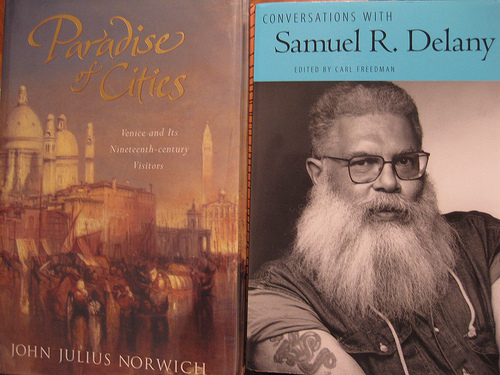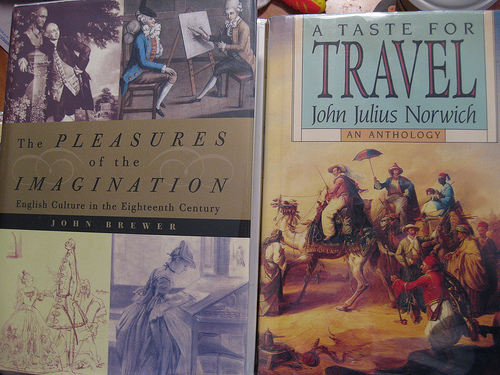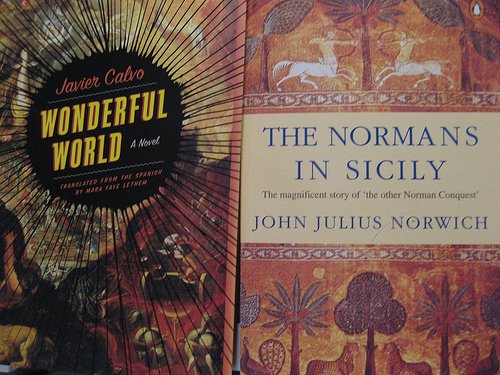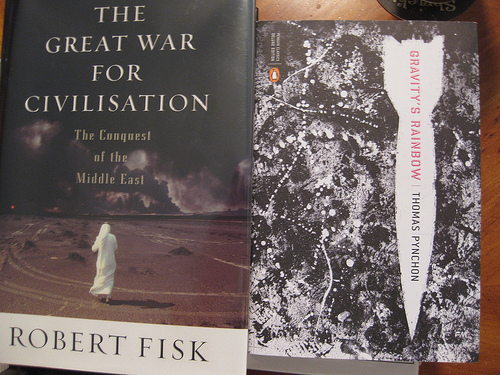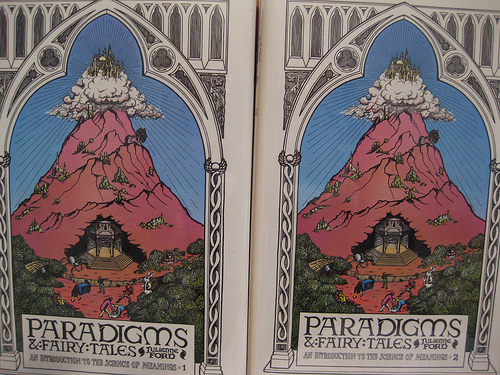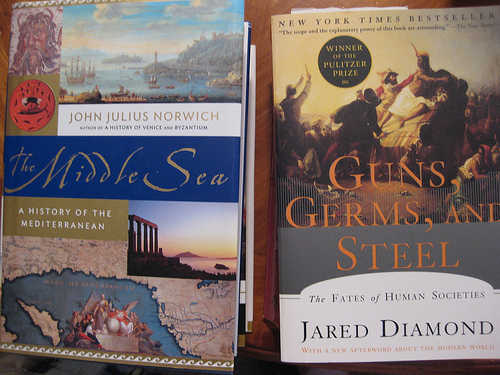Jeff VanderMeer's Blog, page 80
October 14, 2010
John le Carre's My Kind of Traitor
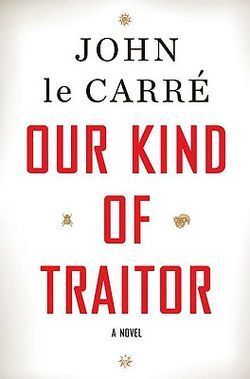
Two years ago I was in the bookstore searching for something to read and my eye alighted upon a whole row of John le Carré novels. I decided to give them a try, and since I tend to gorge when I read, I bought the first twelve of them right then and there.
I read the first one, didn't think much of it, skipped to The Spy Who Came in From the Cold, liked it but didn't love it—the ending was too melodramatic and stagey for me—and then read The Looking Glass War and was, from the opening scene, blown the f— away. The use of coincidence for deepening crisis, the ineptitude of the players in the spy services, the desperation of the resulting mission, including the inadequacy of preparation—all of this had a maturity and kind of controlled insanity to it that appealed to me.
I then hungrily devoured (and savored) A Small Town in Germany, which I still think is one of le Carré's best novels, with so many places where, as a writer, he impressed the hell out of me with his use of craft, while still delivering on an emotional level. By the time I hit A Small Town in Germany, I was having to re-read sections and take notes on all kinds of things he was doing stylistically, approaches to narrative and character, the way he doesn't usually let character movements be generic, not to mention the way he describes speech in interesting ways.
If we were talking about a great boxer, we'd talk about all of the small things he does well. Like, that little half-step to the left after delivering a punch while turning his shoulder, or the almost imperceptible feint to the right that results in the opponent not just missing but leaving himself open for a counterpunch. Or the way he leans on his opponent while on the ropes to tire him out. Le Carré is that great boxer for me. I see all of the little things he does in his fiction and how that sets up the bigger things, and I'm in awe. So much appears so effortless, and yet it takes monumental effort and practice.
After A Small Town in Germany, I got blissfully lost in the George Smiley novels and didn't come up for air for six months. Looking at some of those novels, there are fewer pages unmarked than marked. I took at least two years off of the learning curve of acquiring the kind of technique on display, just by reading and re-reading those novels.
Then I came to A Perfect Spy and le Carré kicked my ass again, but in a different way. He found a way to merge the spy thriller and what in the literary mainstream would be called a detailed, complex, and intense portrait of a man from childhood to the present-day of the novel. It's riveting, moving stuff, and one of my favorite novels.
Although not all of his recent output has hit those highs, le Carré continues to impress me and to motivate me. Now in his 80s, he's continuing to engage with the world as it currently exists—to dive into the moral ambiguity and controversy—not how it existed when he wrote his most iconic novels about the Cold War. Sometimes his work is on a smaller scale now, sometimes you can see the joins. But then you read something like the first sixty pages of his latest, Our Kind of Traitor, and your mouth drops open again. That first sixty pages is as adroit and skillful an opening to a novel as I've read in the last year.
Anyway, I've posted the first of a few short pieces on the man's work on Omnivoracious, and as I post more I'll try to also post here, if I have time. I'd like to mirror the posts from a reader's perspective on Omnivoracious with ones from the writer's perspective on Ecstatic Days.
John le Carre's My Kind of Traitor originally appeared on Ecstatic Days on October 14, 2010.




October 13, 2010
Reading Gravity's Rainbow: First 75 Pages, Initial Contact

"Entertainment" and "pleasure" are somewhat devalued words when it comes to reading novels, subject to inflation both through overuse and through association with commercial fiction. With that caveat, I am being mightily entertained, and deriving much pleasure from, Thomas Pynchon's Gravity's Rainbow. I've come to the novel after many months of speed reading and of fragmented reading, and reading that lived up to the promise of the text: which is to say, if the text itself isn't doing much interesting, then why not power-skim it? It only matters what's going to happen next anyway.
But seventy-five pages into Gravity's Rainbow (and 18,000 words into my next [short] novel, which is creating lightning bolts in my brain), Pynchon's novel has proven resistant to restless eyes, to sideways glances, to anything other than slow, immersive reading, and I'm thankful for it. Is it effect or cause that during this time I'm developing a resentment toward answering email, or performing any tasks not connected to reading or writing?
The first thing about the novel that strikes me is the language—its precision, power, and ambition in support of the multiple ways in which Pynchon approaches entry into narrative and character. Its rollicking good (black) humor and assuredness also impress. It's hard for a text to make me laugh, disturb me, and move me all in the space of a few pages.
What makes the novel so difficult? A lot of characters, and many abrupt transitions into other points of view or into internal reveries that can jolt the reader initially.
Which is fine with me—I'm willing to be ignorant for awhile. I'm willing to live in the dark.** I'm also willing to go back and search for clues, which is why I have now stopped forward progress to re-read the first 75 pages, after which I'll lurch forward with the context further strengthened in my mind.
Gravity's Rainbow, in my humble opinion, forces the reader to adapt to its strategies, and the first thing it requires is a careful read. If you're not willing to give it a patient, honest read, there's no point in starting.
Other basic ground rules I've found useful.
—Don't assume who the POV character is at the beginning of a scene until Pynchon makes it explicitly clear.
—Don't expect the normal context and anchors and foundations provided by most authors, at the points at which you might expect them elsewhere.
—Therefore, be prepared not to understand a scene fully until later, when other clues or scenes illuminate it.
—Therefore, be at peace with the idea of being puzzled, even deeply perplexed, and try to enjoy the prose in the moment.
—Further, the lack of context will mean you encounter scenes that will make you deeply uncomfortable, even upset, until you find the later key that puts it in the proper context. Even then, you may feel vaguely disturbed.
—A re-read, especially "regrouping" re-reads while encountering the text for the first time, is a good idea, as this will prove essential to fortifying connections, making bridges between events and characters, and in general bringing the novel into focus.
—Recognize that some terms you may not grok because they're specific to the World War II era, or specific to the idioms of writers working in the 1970s. Treat such terms as learning opportunities, or treat them like the small, benign, knotted tumors of made-up words you find in some forms of science fiction.
Yesssss, very basic, but has worked well for me. Once I've gotten back to page 75, I'll post about the experience more directly…i.e., engage the text.
**My first major reading experience was The Lord of the Rings trilogy at the age of eight or nine. My parents gave it to me and in some ways it was a bit like a Rosetta Stone combined with the monolith from 2001: I didn't understand all of it at that age, the vocabulary being beyond my reading skills a lot of the time, but I understood enough to be intrigued and to keep reading, and in some ways the mystery of what I didn't know made the novels more compelling than they wouldn't been otherwise, because I had to create connections, motivations, and narrative to fill in my blind spots. Indeed, my most complete understanding of the trilogy, in a future reading, left me sad and disappointed because the reality of what was on the page couldn't compete with what I'd conjured up in my mind (even though it was still triggered by Tolkien's own imagination).
Reading Gravity's Rainbow: First 75 Pages, Initial Contact originally appeared on Ecstatic Days on October 13, 2010.




October 11, 2010
Underground Transmissions
The soundtrack's definitely Arcade Fire and Magnolia Electric Company/Songs Ohia. The mood's somber but punctuated by absurdist humor. The themes are threading through the text, and the text is simplifying and complicating itself. The characters are branching and changing and doing odd things to the plot. The plot is coming to lift itself clear while still being inundated and bombarded by solid state narrative particles. Long walks in the woods are bringing a whole world into being in my head, and I'm assimilating people's mannerisms, textures, sounds, at a heady rate. I'm an Absorber of Nothing Spectacular. I'm having moments of religious ecstacy–the religion of story-building. I'm having moments of euphoria and then of near tears. Means nothing to the reader, necessarily, but means a lot to me. ("That's nice, Jeff. You go on cracking up to get in deep, but leave us out of it.")
Perhaps more importantly, I feel like I'm on a journey I've never been on before–in fact, a journey I can find few parallels to in the history of fiction. Given that my next fiction project after Borne, Komodo, is similarly unique, at the very least I'm going to crash and burn and bounce through the wreckage in ways no one's done before.
Avaunt!
Underground Transmissions originally appeared on Ecstatic Days on October 11, 2010.
October 6, 2010
P.S. This Book Is Restoring Mah Brain Powers to Mah Brain
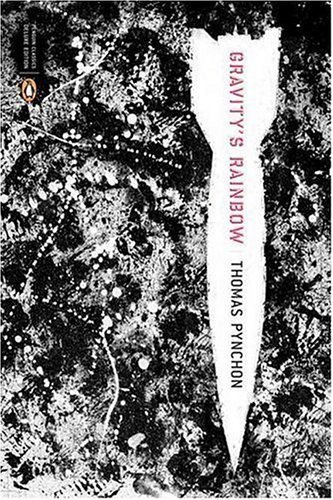
Every year since I was 28, right after I'd finished the novel V, I have pulled out the above novel and tried to read it…and failed for some reason, putting it aside after about four pages. As part of my "Restore Jeff's Brain Powers to His Brain" campaign, I picked it up again this past weekend…and I've soldiered on past page 75. This time I decided to just let it wash over me and hope I'd find an anchor somewhere…and I did. To the point where I'm now going back to page one and "rewriting" it with mah new brain powers to add in any context I didn't pick up on the first time around, before moving forward from page 75.
Why now? No idea. Perhaps something I read in the last year was the software I needed to load before shoving this advanced shit into my mind. Anyway, I'm loving every minute of it, and I'm especially loving having to go slow and to parse meaning out things. And I'm even more loving the fact that there's a huge freakin' dream-monster haunting a diplomat that just comes out of nowhere! And a secret mythology of bombs! And this weirdo growing bananas. And crazy experiments. But that it isn't gonzo, it isn't lightweight, it isn't just farce. I think I'm in love.
Okay, carry on with your lives. I've got to pack for Richmond.
P.P.S. Gio Clairval and I sold our collaborative story, "Lizard Dance," to Fantasy Magazine. (I must add that Gio did the heavy lifting.)
P.S. This Book Is Restoring Mah Brain Powers to Mah Brain originally appeared on Ecstatic Days on October 6, 2010.




Monsters: Way to Get Past My Defenses, Movie
Ann and I watched Monsters last night on On Demand—the theatrical release is in November, I think. Wow. What a surprise. Proper deployment of monsters so it doesn't get stupid. Nice visual development of the contaminated zone. A minimum of plot holes (there are a couple.) A somewhat complex relationship, with the guy clearly meant to be a bit of a jerk, but not in the usual broad, swaggering sense. Some dialogue you don't expect, and a few twists that aren't really twists–it's just you've seen so many movies of this sort you think you know where it's going to go. Nice cinematography.
Um, and the alien life forms…involve both fungi and squid. Get out of my daydreams, movie! Stop plundering my brain!
Okay, off to Richmond for writer's conference.
Monsters: Way to Get Past My Defenses, Movie originally appeared on Ecstatic Days on October 6, 2010.
October 5, 2010
Sam Van Olffen's Visionary Art–on io9
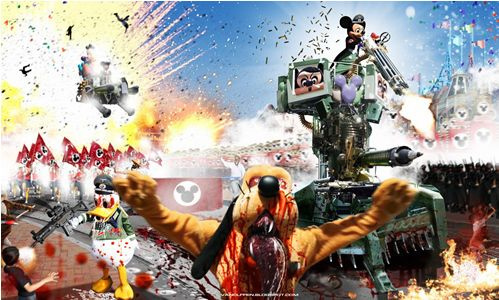
(One of my favorites of Van Olffen's art: Happy Land Warzone 2.)
Ann's posted her latest io9 art gallery, this time of artist San Van Olffen's work. Van Olffen has art in both the forthcoming Steampunk Bible and the Thackery T. Lambshead Cabinet of Curiosities. You can find more of his work here.
Sam Van Olffen's Visionary Art–on io9 originally appeared on Ecstatic Days on October 5, 2010.
October 4, 2010
The Orange Eats Creeps: Three Creeps Eat the Orange

This is one of a troika of reviews simultaneously posted, without prior discussion, on this blog, on The OF Blog, and Empty Your Heart of Its Mortal Dream, with an additional post on Omnivoracious, the Amazon book blog.
"The '90s Pacific Northwest is refracted through a dark mirror, where meth and madness hash it out in the woods. A band of hobo vampire junkies roam the blighted landscape—trashing supermarket breakrooms, praying to the altar of Poison Idea and GG Allin at basement rock shows, crashing senior center pancake breakfasts—locked in the thrall of Robitussin trips and their own wild dreams. A girl with drug-induced ESP…searches for her disappeared foster sister along 'The Highway That Eats People,' stalked by a conflation of Twin Peaks' 'Bob' and the Green River Killer, known as Dactyl." – The Orange Eats Creeps, cover copy
With The Orange Eats the Creeps by first-time novelist Grace Krilanovich, we're not in Wonderland anymore: we're fully through the Looking Glass and out the other side. One of my favorite novelists, Steve Erickson, writes in his introduction, "The exhilaration of such a novel is nearly beyond calculation. If a new literature is at hand then it might as well begin here." But I find his associating the novel with the Decadents and the Beats to be perhaps more helpful, and it's in these connections that the novel began to make sense for me. Take, for example, this early paragraph:
"Safeway at sunrise: we storm through the doors; totally wasted we run for the back, behind the scenes. We barricade the door so Josh can menace the bag boy. What would happen if you harnessed the sexual energy of hobo junkie teens? The world would explode and settle on the surface of another planet in a brown paste, is what. Cockroaches would lick it up and a new wave of narcissistic gypsy-slut shitheads would hatch out of tiny pores on their backs."
Or, "We not only devour eat other, but we bite, hard. We're blood-hungry teenagers; our rage knows no bounds and coagulates the pulse of our victims on contact. we devour them, too; the bodies of mortals become drained when they reach our fangs. Our cause is nothing…I've been living off crank, cough syrup, and blood for a year now. I ride the rails with a bunch of immoral shitheads, hopping freight trains, secreted away in rail cars across this country. We have no home, no parents. I can't remember being a child, maybe I never was one. But I'm sure I'll never die; I get older, my body stays the same. My spine breaks and then gets back together. I have the Hepatitis, I give it to everyone, but it never will actually get me. Our kind doesn't die from anything, all we do is die all the time."
Or, "The city smelled like a wet paper bag. That great big dirty rag hung up in the sky, casting a shadow over the middle of town. A motel was strangely and inexplicably equipped with a smokestack and it spit streams of pigeon-shit colored smoke up into the sky."
Rimbaud, Huysman, Kiernan, Brite–they're all in there, along with a very dark, almost malevolent sense of humor. Luckily, the author doesn't hamstring the text by trying to pull back, trying to make the narrator seem nice at any point or non-judgmental, or even the text itself.
The novel also has an attachment to both specific detail of a sometimes disturbing kind—rendered in a way that highlights this disturbance but by sheer dint of being so well-defined makes it also compelling and at times oddly beautiful–and lovely changes of direction and emphasis within paragraphs and within pages.
For example, the narrator indulges in a brief reverie about seagulls…"vague, blurry pods some distance overhead appearing out of the vapor, emerging as fuzzy flecks out of black, hundreds of them tossing up so much racket, visually too with the lame half-falling way they fly. I was sure something horrible had happened to produce this; perhaps a giant dumpster had been disturbed a mile or so off, behind a Safeway, a huge noise in itself, where the gulls had become increasingly upset to scatter like flecks of ash from an amoral fire."…which is followed by, "In other news, historically speaking, I originally turned vampire on my fourteenth birthday three years ago, as a symptom of, or maybe a response to, things getting really bad at home." Such juxtapositions not only create a kind of lovely absurdism but, in terms of fleshing out a character that can sustain a novel, do an excellent job of conveying narrator-as-teen-girl.
All of this—the description, the juxaposition of the real and the surreal—also begins to make the reader see the world anew, begin to think that perhaps our gaze is too jaded and that were Earth another planet and we visitors to it, we might see our urban spaces in this way. We might, in fact, understand the true ugliness of them; how much do we edit out?
As for other characters, there's a sense of men as predators that invests the novel with unease and a distinct point of view. Men are generally obstacles to get around, threats to avoid or overcome, or sources of short-term security or satisfaction. Some observations are judgmentally hilarious and transform the real world into something stranger and more absurdist: "Truckers are mustachioed weirdos. They sleep in tiny apartments wedged between their big-ass engine and whatever they've got hitched back there. They settle into these metal cubes of gassy, local air with maybe a small TV and square blankets and just wait it out with all their lumber chained up behind them."
It's possibly the time at which I came to The Orange Eats Creeps, but in a way curiously similar to Proust—a writer about as different from Krilanovich as you can get—the novel carries you with it; you have to let the prose wash over you. At the same time, The Orange Eats Creeps is an urgent novel–in the best Decadent tradition, it is describing the underbelly, and documents the disease and filth of society, with the beauty of its language comes from tackling ugly things head-on. It's visceral, tactile, disturbing, and thankfully not in any sense like the kind of "moral fiction" praised by John Gardner. (Fiction has no responsibility to be of use, to be political, to be social, to be sociable, to be anything than some reflection of some version of a truth.)
There's, as mentioned, then, that strange beauty you find at the heart of the best surrealist and decadent texts, descriptions both effective and deliberately over the top like "Their collective misery built a house of flames in the middle of the forest…a tent of burning fibers braided through with suffering. The corpulent membrane blew up like a balloon and sat empty like an incubator of death trapped at the bottom of the trees—which hissed, Remember, it's black, it's always black." In some ways, it feels like what would happen if the short story writer Kelly Link went nuts, developed a insatiable appetite for visionary horror fiction, and then became a devotee of William Burroughs. It also has a texture that shares commonalities with visionary painters like Myrtle Vondamitz III. (Not to mention, some confluence with odd indie comics creators who tend toward the boschian.)
By now you may have noticed I haven't spoken much about the plot of The Orange Eats Creeps, and perhaps that's because the David Lynch description above is also apt. The excitement and originality of this novel is in the reader's explorations of it along the way, through the narrator's unique perspective–her way of seeing (and not seeing) things, and the language, which continues to surprise and challenge long after you've finished the book.
"The things you've made–your creations, little minions, little lumps of cloth, little masks—will leave you. You can't really own them even though they are shadows of your body. Symptoms that will be shed, forming the residue of your life on the surface of your existence, like all surfaces that your eyes have coated with their gaze. Like a snake shedding its skin, your residue forms a ghost image all over town, everywhere you have ever been. Don't fight it. The ghost guide will lead you all over the world in connecting shadows, a chain link of dark felt memories."
The Orange Eats Creeps: Three Creeps Eat the Orange originally appeared on Ecstatic Days on October 4, 2010.




October 3, 2010
The James River Writers Conference–VanderMeer Schedule
Just a brief note that I'll be a guest of the James River Writers Conference in Richmond, Virginia, this coming weekend (October 8-9). My schedule for panels is as follows, in addition to any receptions, autograph sessions, etc.:
Friday, 2:15 to 3:15 pm—Mastering the Short Story, with moderator Virginia Pye and fellow panelists William Henry Lewis and Clifford Garstang
Saturday, 1:00 to 2:00 pm—Changes in Publishing, with moderator John Ulmschneider and fellow panelists Lucy Carson and Joseph Papa
Saturday, 2:15 to 3:15 pm–Fantasy, with moderator Bill Blume and fellow panelists Zachary Steele and Michelle Brower
For more information, visit their website.
The James River Writers Conference–VanderMeer Schedule originally appeared on Ecstatic Days on October 3, 2010.




October 2, 2010
Defrag & Rejuv: A Love Story

(Reading the one on the left I was suddenly struck by the memory of there being another book on the same subject, somewhere in the house, and in my memory this other book had been superior in its treatment of the subject. After a feverish search, I found the other book, pictured on the right…so much for landscape and memory.)
I've had a wonderful week offline for the most part, just working on my new novel, Borne. In the mornings, Ann takes my phone and the router, and I go down to the local coffee shop where I write in longhand for about three to four hours. In the afternoons, I read, I type up what I wrote in the morning, and I work on editing tasks for the Lambshead Cabinet, among other projects. By around four, I either go for a long, hilly hike or hit the gym. Ann comes home, we have dinner, I check the email on my phone. If there's nothing that requires me to be on the internet, I don't get on. If there is, I do, take care of it, do a little blog browsing, and get off the computer again. The next day, I repeat the same schedule.
This may sound relatively normal, but I have not had this routine for over a year. My schedule has been fragmented by impossible deadlines for anthos and coffee table books, book tours, a lot of book reviewing, and other activities that have kept me online. And since I was online a lot, I would use facebook for stress relief, would read a lot of blogs, check out Bibliophile Stalker's links every day, and in general be Connected 24-7.
The more I kept to this schedule, the more fragmented, stressed, and generally unhappy I became. The more twitchy and touchy I'd be, and the more my mood could swing from happy to grouchy in just a few minutes. On facebook, especially toward the end before I had Ann change my password so I couldn't get in, I felt like a kind of performing seal. No one had asked me to become a performing seal, but I'd become one. Even worse, through facebook, twitter, and the blogosphere, there were so many voices in my head, so many opinions, thoughts, and ideas from other people, that I didn't feel like I had any space to myself. I might as well have been uploaded to the Internet and have existed there (and, indeed, I believe that this is now the Attenuated State in which many people now exist).
To some degree, too, writing avoidance was involved. I've lived in the world of Ambergris, the setting for my last three major fictions, for twenty years. With the publication of Finch, I no longer lived in that world. That's a difficult thing from the standpoint of a writer's imagination. At first, it feels like there's nothing replacing it–that there's a kind of black hole where Ambergris used to be, and not a hint of light. It was almost as if I'd ended a major relationship and that person was no longer in my life. You wonder if you can actually write something major that isn't connected to Ambergris. You look at the drafts of the other nascent fictions you have wanted to write but haven't had time yet, and you wonder if you waited too late and the animating spark will have been extinguished.
So it's in that context of an exhausting, fragmented last year and this fear of the unknown—am I still a writer?—that I sat down with Borne. And the emotion foremost in my brain after a week with Borne is…relief. Nothing's broken. Nothing's burned out. My imagination is intact, and the parts of my brain that seem to generate ideas, characters, details, out of nothing…just needed to be defragged, just needed me to stop allowing the internet's million needles of words/info/opinions into my brain long enough for it to consider issues related to fiction without distraction.
When you're hiking and you run out of paper and you start scribbling notes on leaves and bark, you can be pretty sure the animating impulse hasn't been lost. Which is a relief. A joy. A privilege. Calming. Fun. Ecstatic.
So this is a very round-about way of saying I'll be off facebook for probably the rest of the year, at least. That the blogging here will be sporadic and probably on esoteric topics or weird books but not particularly controversial or relevant to whatever brushfire has broken out on the intertubes. I want my brain to be focused on what makes me happy. Thanks to Ann, btw, for helping me refocused on what's important. And, thanks to this site for helping me clarify a few things in my own head re Finch, which will result in just a few tinkers to the novel for any future editions.
Another part of rejuvenation is catching up on my reading, mostly my nonfiction reading. Here're a few books I'm finally getting back to (looking for recommendations re good books on the wars in Angola, btw)…
Defrag & Rejuv: A Love Story originally appeared on Ecstatic Days on October 2, 2010.




September 29, 2010
Our Tragic Universe(ity?), Karin Tidbeck, Decadent Lit, Last Drink, Goodbye Again
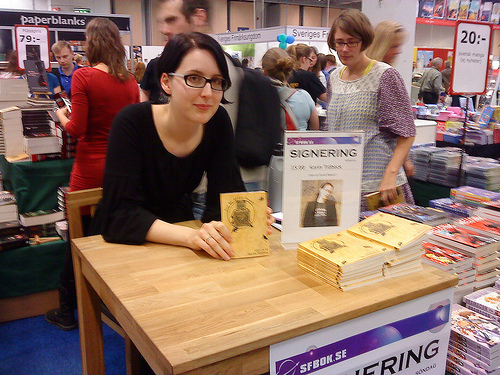
(The extremely talented Karin Tidbeck, late of Clarion San Diego, safely re-ensconced in Sweden, signing her first collection, just debuted! She signed a copy for Peter F. Hamilton, among others. Me want book even though me no can read!)
I reviewed Scarlet Thomas's Our Tragic Universe (not "University" as in the headline) for the Washington Post. I like digressions and meandering in my novels, but even for me, this book was self-indulgent, baggy, unbelievable, lectury, annoying, AND DID NOT PROPERLY DEPLOY THE MONSTER!, well-written, witty, at times, yes, even charming…but ultimately a big ole pile of almost-cool. Rarely have I, page by page, found myself hoping so much for some kind of recovery, because on a line-by-line level there's much to like. I really now want to seek out her other work, and even though I also agree with this NYT book review, seek out Adam Roberts' Strange Horizons' review for a more positive opinion (even though I think he's temporarily gone bonkers). I have a feeling the author will want to flense me alive after reading the review, but I really really do hope others like this book more than I did.
Where has the decadent novel gone? What the bleeping bleep-bleep?!?! Yeah, well, the respectable Decadents got reclassified as Symbolists–or that's how the joke goes. But this was not perceived as particularly upstanding stuff at the time, so why's he going lookin' for it in the hoity-toity places? How about giving K.J. Bishop a bit of your time? Or some of M. John Harrison? Rikki Ducornet? Some of my stuff (although, you know, I can't even take the Decadents seriously, because there's something wrong in mah head–I am an absurdist.) A ton of others, but you might find them in, ahem, New Weird (if that term makes you allergic, consider calling it Motile Weird). In fact, if you'd looked a little closer, you might've found The Orange Eats Creeps by Grace Krilanovich, just published.
Amazon has given Shared Worlds a substantial grant–more next week!
Also, I had the date for Capclave and the Last Drink Bird Head awards wrong–it's October 23, not October 16, now corrected here.
Borne borne borne.
KThxsbai
Our Tragic Universe(ity?), Karin Tidbeck, Decadent Lit, Last Drink, Goodbye Again originally appeared on Ecstatic Days on September 29, 2010.





